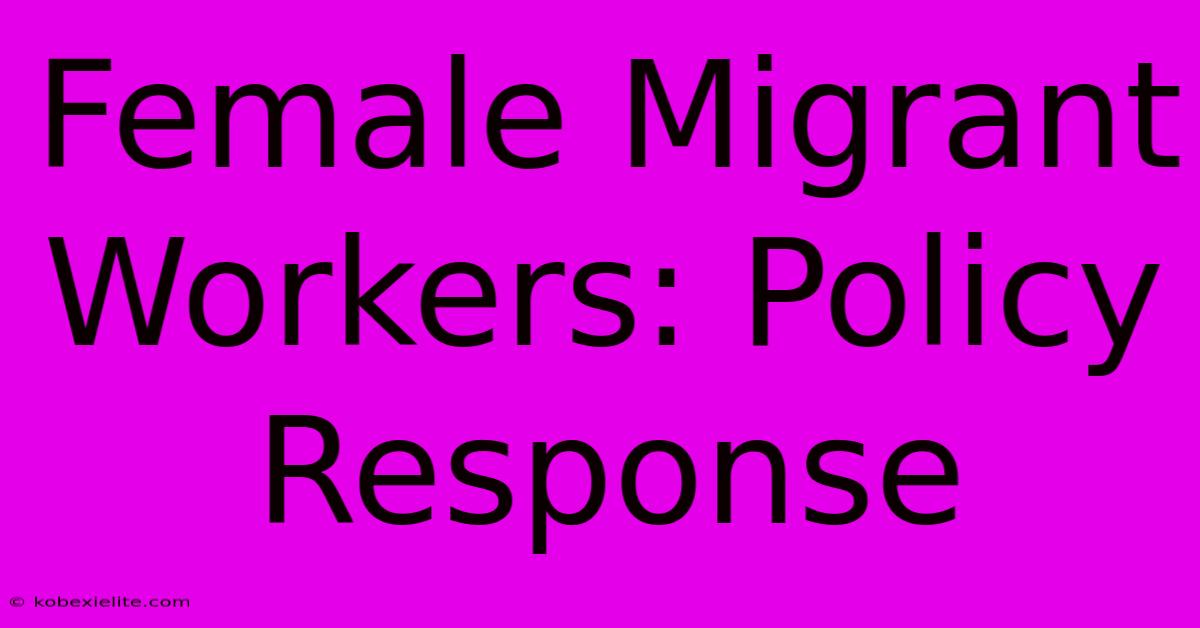Female Migrant Workers: Policy Response

Discover more detailed and exciting information on our website. Click the link below to start your adventure: Visit Best Website mr.cleine.com. Don't miss out!
Table of Contents
Female Migrant Workers: Policy Response – Addressing the Challenges and Protecting Rights
The global landscape is increasingly shaped by the movement of people, with female migrant workers forming a significant and often vulnerable segment of this population. Understanding their unique challenges and developing effective policy responses are crucial for ensuring fair treatment, protecting rights, and fostering sustainable development. This article delves into the key issues surrounding female migrant workers and explores policy options for a more equitable and just system.
The Unique Vulnerabilities of Female Migrant Workers
Female migrant workers face a complex web of challenges that often intersect and exacerbate each other. These include:
Gender-Based Violence and Exploitation:
- Increased risk: Women are disproportionately affected by violence, exploitation, and trafficking during migration. Their vulnerability is heightened by factors such as isolation, language barriers, and precarious legal status.
- Lack of protection: Many existing legal frameworks fail to adequately address gender-specific vulnerabilities, leaving women with limited recourse when facing abuse or exploitation.
- Social stigma: Reporting incidents of violence can be further complicated by social stigma and fear of retaliation, leading to underreporting and a lack of effective intervention.
Discrimination and Inequality:
- Wage gap: Female migrant workers often earn less than their male counterparts for the same work, perpetuating economic inequality.
- Occupational segregation: They are frequently concentrated in low-skilled, low-paying jobs with poor working conditions, limiting their opportunities for advancement.
- Limited access to services: Access to healthcare, education, and social services is often restricted, impacting their overall well-being and economic security.
Lack of Legal Protection and Documentation:
- Irregular migration: Many female migrant workers are undocumented, making them particularly vulnerable to exploitation and abuse. Their lack of legal status limits their access to legal protection and recourse.
- Weak enforcement: Even when laws exist to protect migrant workers, enforcement can be weak, leaving women with little practical protection.
- Complex bureaucratic processes: Obtaining necessary documentation and navigating immigration procedures can be challenging and expensive, further marginalizing vulnerable women.
Policy Responses: Towards a More Equitable Future
Effective policy responses require a multi-pronged approach that addresses the root causes of vulnerability and promotes the rights and well-being of female migrant workers. Key areas for policy intervention include:
Strengthening Legal Frameworks:
- Comprehensive anti-discrimination laws: Legislation should explicitly prohibit discrimination based on gender, nationality, and migration status.
- Robust labor laws: Effective enforcement of labor laws is crucial to ensure fair wages, safe working conditions, and protection against exploitation.
- Protection against trafficking and violence: Specific legal frameworks should address gender-based violence, trafficking, and sexual exploitation, providing pathways for reporting and seeking redress.
Improving Access to Services:
- Healthcare access: Ensuring access to affordable and culturally sensitive healthcare services, including reproductive health services, is paramount.
- Education and skills training: Providing opportunities for education and skills development empowers women and improves their employment prospects.
- Social support networks: Establishing support networks and community-based organizations can provide crucial assistance and guidance to female migrant workers.
Promoting International Cooperation:
- Bilateral agreements: Agreements between countries of origin and destination can establish clear frameworks for the protection of migrant workers' rights.
- Information sharing: Sharing information on best practices and challenges can contribute to more effective policy development.
- Capacity building: Investing in training and capacity building for relevant stakeholders can strengthen enforcement and improve service delivery.
Empowerment and Advocacy:
- Voice and participation: Ensuring that female migrant workers have a voice in shaping policies and programs that affect their lives is critical.
- Support for women's organizations: Investing in women's organizations working to support and advocate for the rights of female migrant workers is essential.
Conclusion:
Addressing the challenges faced by female migrant workers requires a concerted and collaborative effort. By implementing comprehensive policy responses that prioritize their rights, protection, and empowerment, we can create a more just and equitable future for this vulnerable population. This necessitates a paradigm shift from a solely security-focused approach to one that recognizes the significant contributions of female migrant workers and their right to a safe, dignified, and productive life. The ultimate goal should be to foster a world where migration is a choice, not a necessity driven by desperation and vulnerability.

Thank you for visiting our website wich cover about Female Migrant Workers: Policy Response. We hope the information provided has been useful to you. Feel free to contact us if you have any questions or need further assistance. See you next time and dont miss to bookmark.
Featured Posts
-
Mainoo Garnacho Manchester United Update
Jan 09, 2025
-
Tottenham Bentancurs Injury Status
Jan 09, 2025
-
Tottenham Liverpool Match Bergvall Goal 2024
Jan 09, 2025
-
Tottenhams Bentancur Injury Latest
Jan 09, 2025
-
Dobrik Reveals 2 Month Body Change
Jan 09, 2025
